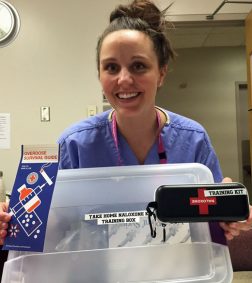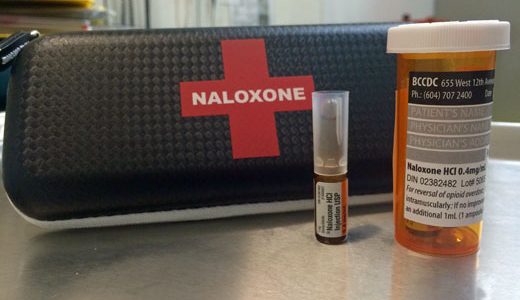VGH ED latest to join overdose battle
“People are so excited. We had 20 nurses who jumped at the chance to be super users for peer education,” says Jaime Gallaher, clinical nurse educator, at the VGH Emergency Department (ED).

Jaime Gallaher, clinical nurse educator, with a take-home naloxone kit for overdose patients discharged from the ED at VGH.
Thanks to Jaime and her fellow super users, 47 VGH ED nurses have participated in peer-to-peer education equipping them to distribute take-home naloxone kits to overdose patients discharging from the ED. Since last week, nurses have distributed six kits.
“I’m very excited to be part of a harm reduction program,” says Jaime. “It’s not as common in emergency to do harm reduction and education, so this is really exciting to be on the other end. And we don’t need a physician order, if the nurse identifies that a patient needs a kit, the nurse can initiate it.”
The VGH ED is now one of five VCH/PHC Emergency Departments distributing the free kits. Within a month or two, all 14 EDs and urgent care centres will have kits available. Staff at Bella Coola General Hospital are up next to take the training.
What is naloxone?
Naloxone, or narcan, is a medication that reverses the effects of an overdose from opioids (i.e. heroin, methadone, morphine, oxycodone and fentanyl.) Giving naloxone can prevent death or brain damage from lack of oxygen during an opioid overdose. Naloxone has been used in Canada for more than 40 years. It is used by staff at Insite to reverse overdoses.
Why Emergency Departments are key
Medical Health Officer Dr. Mark Lysyshyn says EDs are strategic dispensing sites. “People who’ve survived an overdose are at high risk of dying from a subsequent overdose,” he explains. “This makes the Emergency Department a key site for giving people take-home naloxone and making sure they know how to use it. It can be a real teachable moment.”
Responding to the public health crisis
The addition of EDs in the Take Home Naloxone (THN) Program is in response to the surge in fentanyl-related drug overdose deaths across the region. In April, BC’s provincial health officer declared a public health emergency due to the alarming rise in drug-related overdoses and deaths.
From January 1 to August 20, 2016, there were 3,775 illicit or unknown drug overdoses presenting to VCH EDs. Nearly one-quarter, or 882, of these cases were opioid-related, and 79 per cent occurred in Vancouver.
Non-acute sites with take-home kits
There are 62 additional sites, including community health centres and harm reduction services, where people who use drugs can also access the free kits. All sites are listed on the Toward the Heart website (choose naloxone from the drop-down box), a Provincial Harm Reduction Program.
Learn more
For more information about overdose prevention and how VCH is responding, visit www.vch.ca/overdose.

